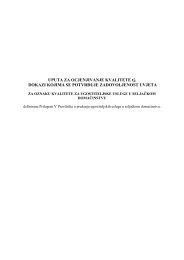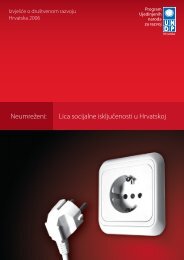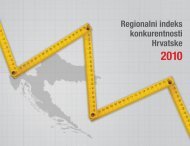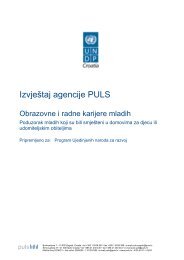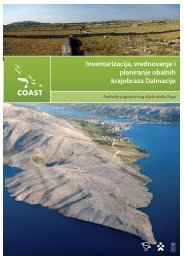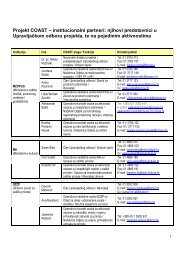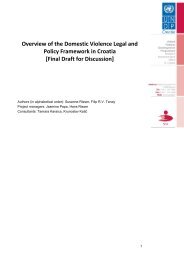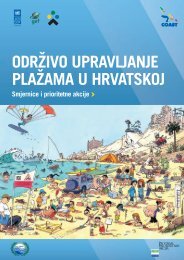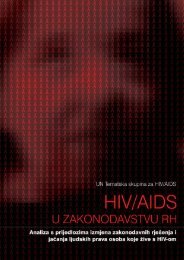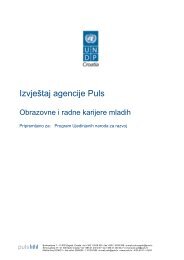WEB engleska verzija end.indd - UNDP Croatia
WEB engleska verzija end.indd - UNDP Croatia
WEB engleska verzija end.indd - UNDP Croatia
- No tags were found...
Create successful ePaper yourself
Turn your PDF publications into a flip-book with our unique Google optimized e-Paper software.
CHAPTER 3THE SOCIALLY EXCLUDED1. The concept of drinking as deviant behaviourin terms of one’s health and social norms is notapplicable only to alcoholics, but also to all peoplewho drink. The community pays the highest pricefor the consequences of drinking by those whousually do not drink in excess.2. Considering that only minimal quantities ofalcohol are not harmful, social drinking should beviewed as excessive and risky.3. Environmental conditions play the most importantpart in encouraging alcohol-related problems(e.g., public advertising of drinking and alcoholicdrinks, positive views of drinking), as well as theavailability of alcohol, and only then the internalpredispositions of the drinkers.Thus, a state strategy for reducing alcohol-related disorderswhich exclusively target alcoholics is not sufficient,and should target the entire drinking populationas well. Although people who drink sporadicallyto moderately have a lower risk of becoming affectedby an alcohol-related problem, the percentage ofpeople who drink moderately in the adult populationis up to 80%, so the problems arising from their drinkingsocially are more numerous and significant thanthe problems of alcoholics themselves.Users of psychoactive drugsAlthough <strong>Croatia</strong> has a well defined National Strategyand Action Plan for Eliminating Drug Abuse, there isno systematic approach to dealing with the problemof drug abuse. Different treatment programmes suitdifferent drug abusers and the same drug addictneeds to receive different treatment programmesdep<strong>end</strong>ing on his or her recovery phase. Currently,there are wide ranging and competing programmesto assist drug addicts, which cater to a specific profileof drug user, leaving some with no services at all.Although various programmes of assistance to drugusers are mutually complementary, their organiserst<strong>end</strong> to compete for funding and public support.3.15.9 Policy ImplicationsAlcohol abusers<strong>Croatia</strong> does not have a comprehensive national programme,or an action plan within the national strategy,for the prevention and elimination of alcohol-induceddisorders, but only isolated measures that regulateindividual alcohol-provoked problems. There seems tobe no policy-related imperative to develop such a plan;no awareness that such a plan should exist; and <strong>Croatia</strong>nexperts do not have the competence to developsuch a strategy. The requirements imposed by theWorld Health Organisation’s Regional Office for Europethat <strong>Croatia</strong> should contribute to the implementationof the European Alcohol Action Plan are not binding inany way. As a result, <strong>Croatia</strong> did not respond in a seriousmanner. However, in order to meet the requirementsof the European Union, <strong>Croatia</strong> will have to create andimplement a national action plan.Users of psychoactive drugsIt is a political and not just a social question as towhether <strong>Croatia</strong> will adopt a progressive platform ofdrug differentiation, according to which the collectiveterm ‘drugs’ does not exist. What exist instead are variousforms of dep<strong>end</strong>ence, each of which has its ownpersonal magnetism, its own degree of harmfulness,its own pattern of consumption and its own specificgroup of users. Thus, it would be best to classify thereasons for dep<strong>end</strong>ence according to the harmfulnessof the different types of dep<strong>end</strong>ence.128



